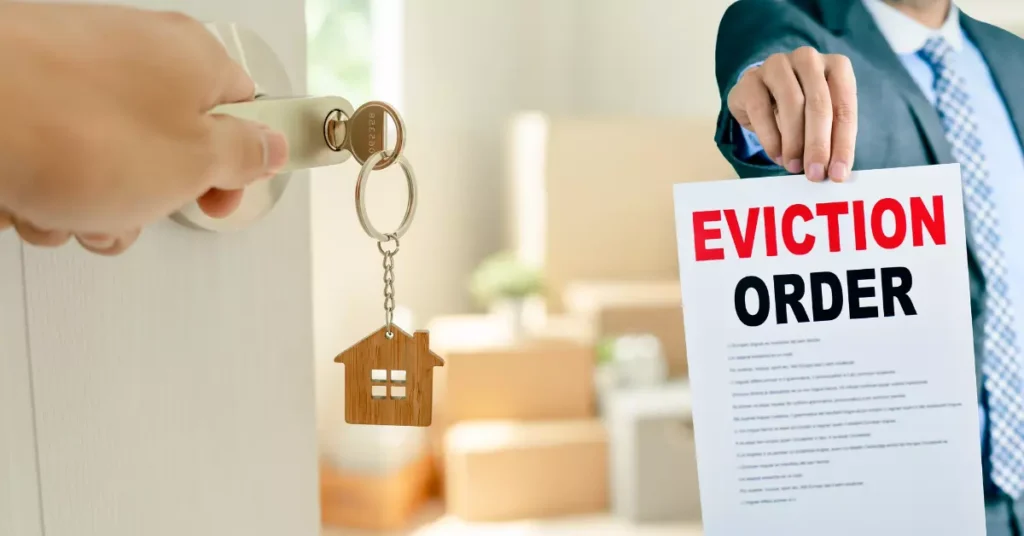What Happens When the Sheriff Comes to Evict You in California?
When the sheriff comes to evict you in California, they will carry out a court-ordered eviction by removing you from the property and changing the locks. This is a legal process that can only occur after the court has issued a judgment for possession to the landlord.
The entire eviction process can seem overwhelming and stressful, especially if you are not familiar with California’s laws surrounding evictions.
In this article, We will discuss what happens during an eviction, your rights as a tenant, and what steps you can take to protect yourself if you are facing eviction.

What Happens When The Sheriff Comes To Evict You In California
Definition Of Eviction
Eviction is the legal process by which a landlord or property owner can force a tenant to move out of their rental property.
It happens when a tenant fails to uphold their end of the lease agreement by not paying rent on time or breaking any other terms of the agreement, including causing damage to the property.
Overview Of The Eviction Process
The eviction process in California is a legal process that can take several weeks or months to complete. Here’s an overview of the general process:
Notice to vacate
The landlord must give the tenant a written notice to vacate the rental property, giving them a specific amount of time to leave.
Filing an eviction lawsuit
If the tenant fails to vacate the rental property within the timeline given, the landlord has to file an eviction lawsuit in court.
Court hearing
The court sets a hearing date where both the landlord and the tenant present their cases. If the court rules in favor of the landlord, they issue a writ of possession.
Writ of possession
The writ of possession instructs the sheriff to physically remove the tenant and their belongings from the rental property.
Understanding The Sheriff’S Role In The Eviction Process
Once the court grants the writ of possession, the landlord must go to the sheriff’s department to schedule an eviction date. The sheriff’s role during an eviction is to:
- Provide a 5-day notice to the tenant before the eviction date.
- Meet with the landlord to verify the eviction details and provide guidance.
- Physically remove the tenant and their belongings and change the locks, if necessary.
The sheriff’s job is to carry out the eviction and ensure that everything is done lawfully and peacefully. They do not have the power to decide if the eviction is justified or not.

Legal Obligations Of The Tenant
As a tenant facing eviction in california, there are a few legal obligations to keep in mind:
- Pay rent on time to avoid breaching the lease agreement.
- Vacate the rental property within the deadline given in the notice to vacate.
- Attend the court hearing and present your case if you wish to challenge the eviction.
- Leave the property in good condition and do not damage anything during the eviction.
If a tenant fails to comply with their legal obligations, they risk being forcibly evicted and having the eviction on their record, which can make it difficult to rent future properties.
What To Expect On The Day Of Eviction
Notice Of Eviction
The eviction process in california begins with a legal notice of eviction, which means the landlord has taken the legal steps to evict you.
California law requires landlords to give tenants at least three days’ notice to vacate the property for nonpayment of rent, illegal activity, or a lease violation.
Once you have received a notice of eviction, you should take immediate action to avoid further legal action.
Sheriff’S Notice Of Lockout
When the landlord has obtained a court order for eviction and has received permission from the court to have the sheriff enforce the eviction order, you will receive a sheriff’s notice of lockout.
The notice will inform you of the date and time of your eviction, which is typically within 5 to 7 days of the notice.
It is essential to follow the instructions on the notice and vacate the premises before the stated date and time.
Timeframe For Eviction
Once you receive the legal notice of eviction, you have a few days to vacate the premises or face involuntary eviction by the sheriff.
The timeframe for eviction differs from case to case but typically ranges from 5 to 7 days after receiving the sheriff’s notice of lockout.
It’s essential to pay attention to the time frame and prepare for the eviction day accordingly.

Preparing For The Eviction Day
On the day of eviction, you should ensure that you are ready to move out before the sheriff arrives. Here are some things to prepare for:
- Remove all personal items from the property.
- Take photos and video of the property to document the condition in which you left it.
- Turn off all utilities.
- Arrange for a moving truck and moving assistance.
- Get a temporary storage unit for your belongings.
Consequences Of Resisting Eviction
If you resist eviction, you risk facing potential criminal charges and fines. It’s essential to comply with the law and take the proper legal action to protect your rights as a tenant.
Additionally, by resisting eviction, you may harm your credit score and make it challenging to rent in the future.
It’s essential to contact legal aid or an attorney to understand your rights and obligations.
FAQs
What Should I Do If The Sheriff Comes To Evict Me In California?
Contact an attorney or legal aid immediately to help you understand your rights and options.
How Much Time Do I Have Before The Sheriff Comes To Evict Me In California?
You will receive a written notice with a 5-day lockout period before the sheriff can come to evict you.
What Happens If I Don’T Leave My Property When The Sheriff Comes To Evict Me In California?
The sheriff can use reasonable force to remove you and your belongings from the property.
Can I Stop The Eviction Process Once The Sheriff Comes To Evict Me In California?
You may be able to stop the eviction process by paying the rent owed or negotiating with your landlord. Contact an attorney for guidance.
Conclusion
Facing eviction is an unsettling ordeal, but remember, you’re not alone. In California, a sheriff’s involvement means it’s serious, but you have rights.
Get legal advice immediately, prepare for your court appearance, and understand the resources available to help you stay housed.
Reference